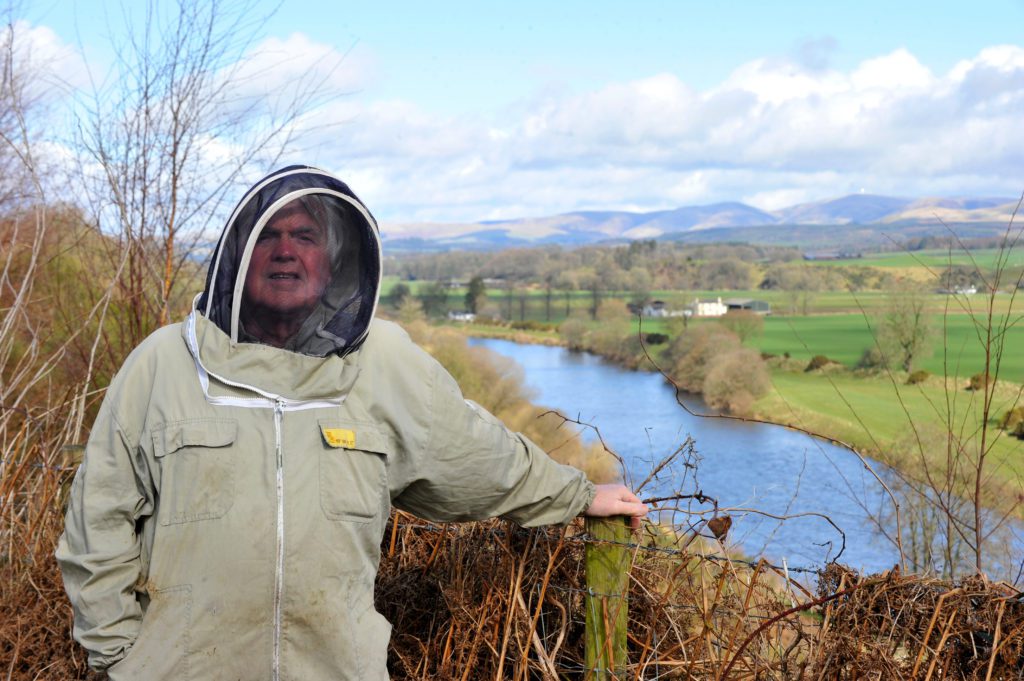John Mellis was brought up in Milngavie, Glasgow, saying: "it was an ideal childhood, we lived on Tannoch Loch so I spent my youth; swimming, fishing and sailing with my brother."
Things have changed, he reflects, "and now everyone is so cosseted."
He turned 75 this year, and is attempting to cut down hive numbers from four hundred to two hundred.
After school he studied civil engineering at Glasgow University, where he flunked his first exams, he said, "I realised it wasn't quite as easy as I had thought.
"I got a degree eventually, but I had to repeat a year followed by a year out. I think they gave me a degree just to get rid of me."
During that year out he worked on a construction site with a very dynamic engineer, Laurie McLaughlin.
John said, "he showed me how to work hard and get on and do things."
"I loved it, playing with big machines digging holes and pouring concrete which was much more interesting than theoretical design."
Studying was followed by a varied career in civil engineering all around the world, working on major projects.
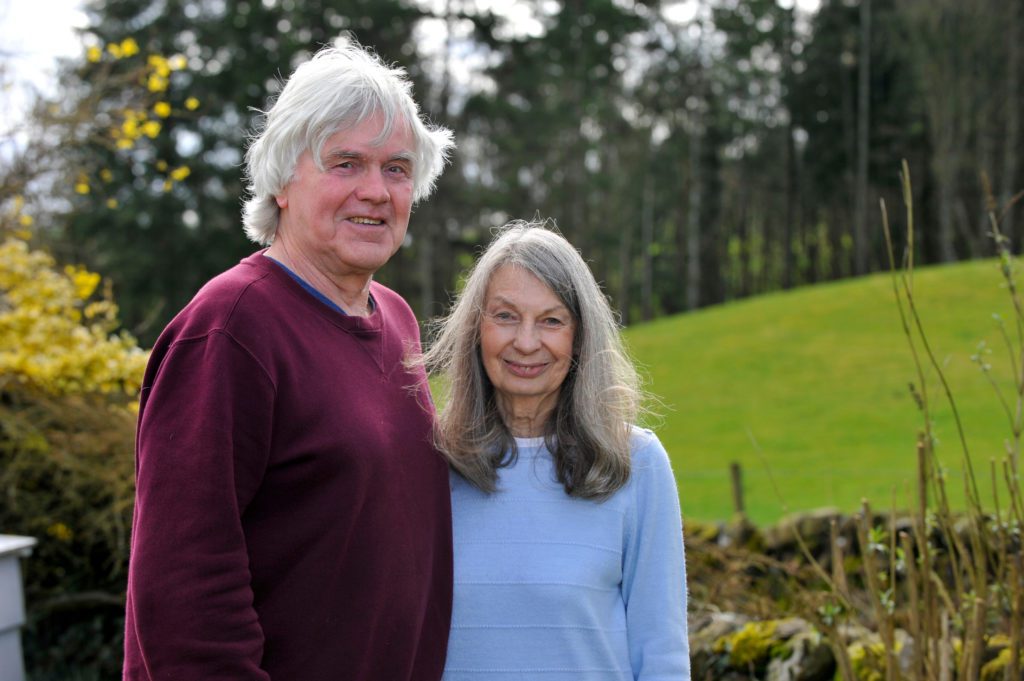
However working abroad meant he missed his partner Joan.
They met over 40 years ago when she was working as the secretary on one of his projects, part of the M8 in Glasgow.
He said "we have been together ever since, when I met her she was a right city slicker. A Glasgow girl, but we are both country people now and we wouldn't dream of anything else."
That M8 project was responsible for introducing him to beekeeping.
He explains, "There was a swarm of bees on the site and one of the guys, from Ireland, knew roughly what to do so he popped them in a cardboard box.
"I was completely fascinated."
They moved the bees to his house, but beekeeping wasn't initially a great success, as they didn't survive.
He worked abroad again but bought new bees to put at the bottom of the garden, this time with greater success.
When he was away he was always thinking about his hives back home, so he decided to end his globetrotting.
He faced the dilemma of going back to civil engineering or finding a sustainable living in Dumfries.
He said, "by that stage I had been keeping bees for 10 years so I had good knowledge about what I was doing, someone locally was selling some colonies and I thought, I think I will give it a go"
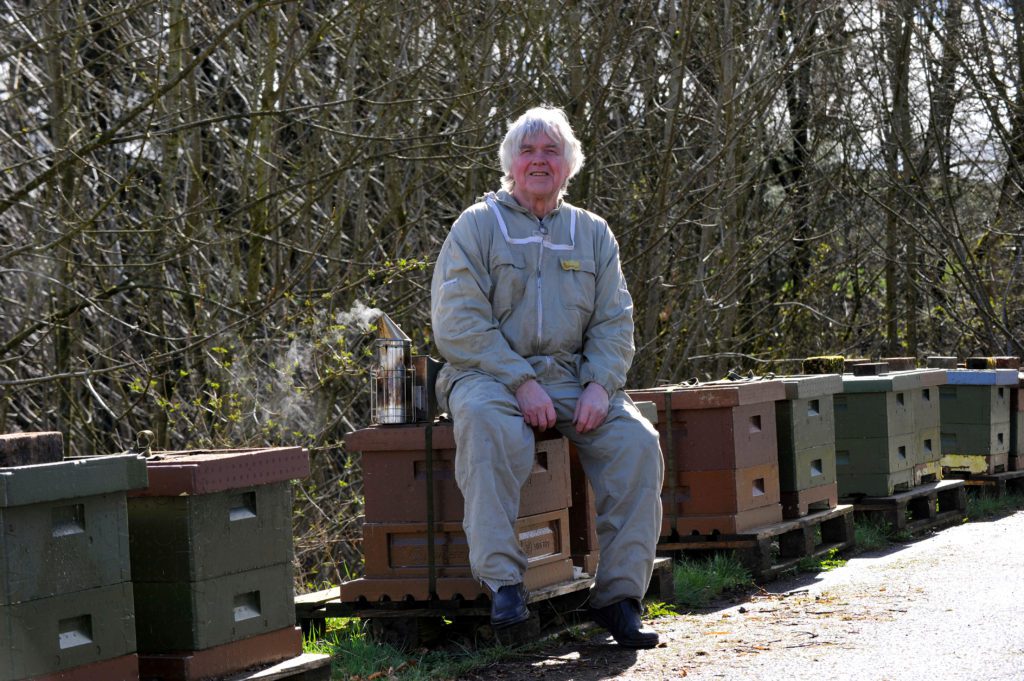
At the end of the first year he had produced a tonne and half of honey.
The hardest part was finding a market, he said, "by the end of year two, I had more hives and three tonnes of honey but little income."
They started making beeswax candles, as well as creating their own bespoke jar labels which gave them an advantage in selling the full range.
Another breakthrough came at a tradefair in Aviemore, "folk were queuing to order from us, because we were something new," John said.
He said, "I work seven days, so I don't have anytime to spend any money so I don't need a lot of it."
He sells five uniquely different honeys: Blossom in both set and runny, Spring honey, Heath and Wildflower, as well as pure Heather.
He said, "I like the way that honey changes, you grab a bit of wild comb when you are working and chew it while it is still warm from the bees and it is just absolutely perfect.
"It is a lot of blooming work mind you."
As a beginner he joined the local association which met in a pub in Dumfries, they talked about bees in the winter and visited an apiary in summer.
He said, "The old worthies would gather round and open up one of the hives and then bicker amongst themselves.
"The novices were standing at the back with no clue what they were talking about.
"I realised this wasn't the best way to learn and we needed a teaching scheme that really focused on the beginners."
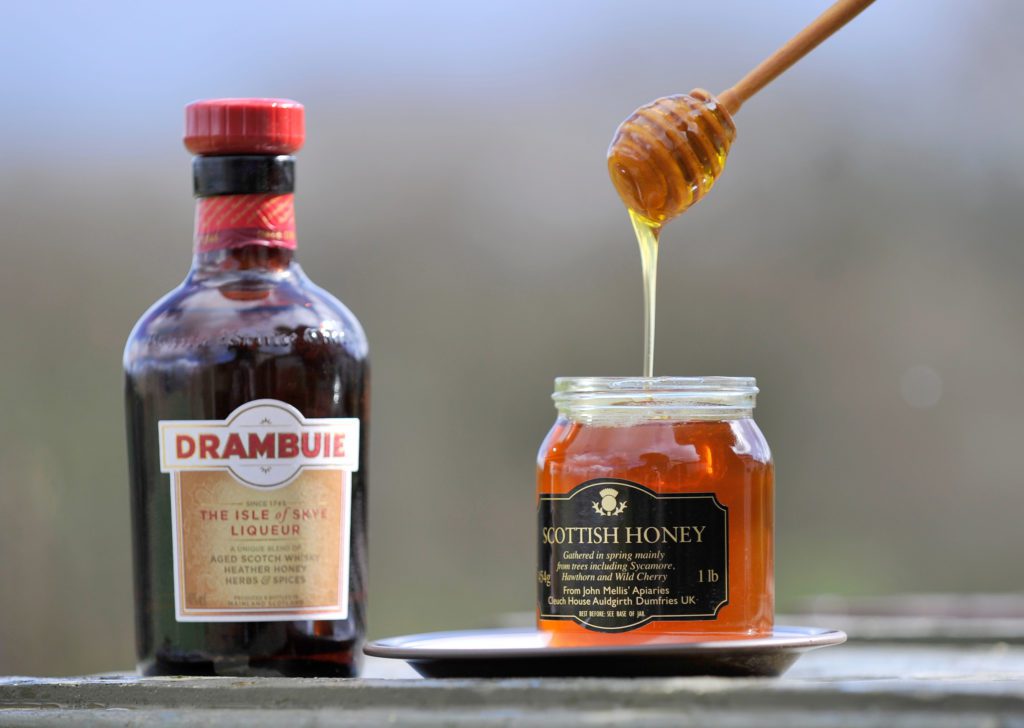
One beekeeper who helped John immensely was Jim Ballantyne, he sadly died suddenly, with 400 hives scattered all over Scotland,
John volunteered to track them all down, as his family were not sure where they all were,
He said, "in the end we managed to find all the bees and I inherited some of his customers, the key one was supplying my Heather Honey annually to Drambuie."
He explains the unique taste of Heather Honey is a key ingredient in the drink.
Scotland produces most of the world crop of Heather Honey, so he said, "there is a massive demand. You think how much heather there is growing in Scotland but how little is exploited.
"It is a great job, when you deliver honey to the bonded warehouse.
"All the scents and aromas of all the spirits in there, bulk tanks of Glenfiddich or Drambuie, and you think. Good Lord, all that booze!"
John said, "You read all the time that the bees are in trouble, but actually it is the beekeepers."
He explains that the best way for beginners to learn about bees is to watch someone else, and South of Scotland Beekeeper Association, have now developed a teaching centre with twenty hives.
He said, "every month a team of eight of our members work with twenty beginners, by the end of the season they have a pretty good idea what to do and our membership has gone from about 40 to 140 in five years."
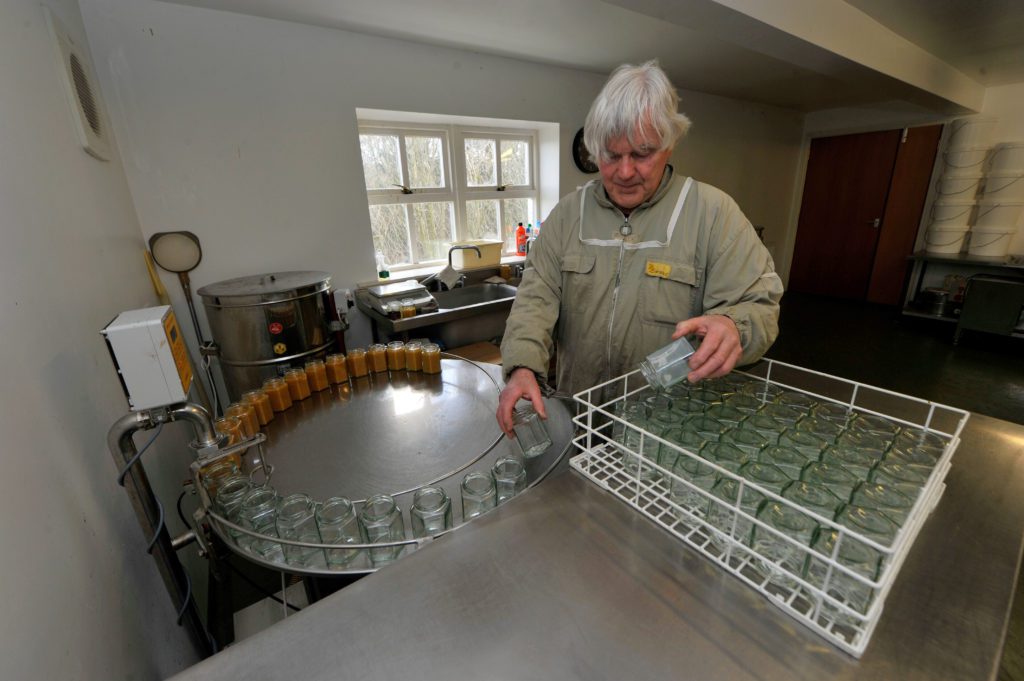
The majority of bee keepers and farmers are getting on in years, and he said, "we need to secure the future of the industry by bringing young people in."
Initiatives like the apprenticeship scheme run by the Bee Farmers Association, mean there are now thirty young people going through a three year scheme to become fully qualified.
But he said, "more needs to be done."
He said to earn an income , "You need at least 200 colonies as a minimum, especially in Scotland where the weather is against us."
Looking after 400 hives alone is tough, and he doesn't want to neglect his tiny charges.
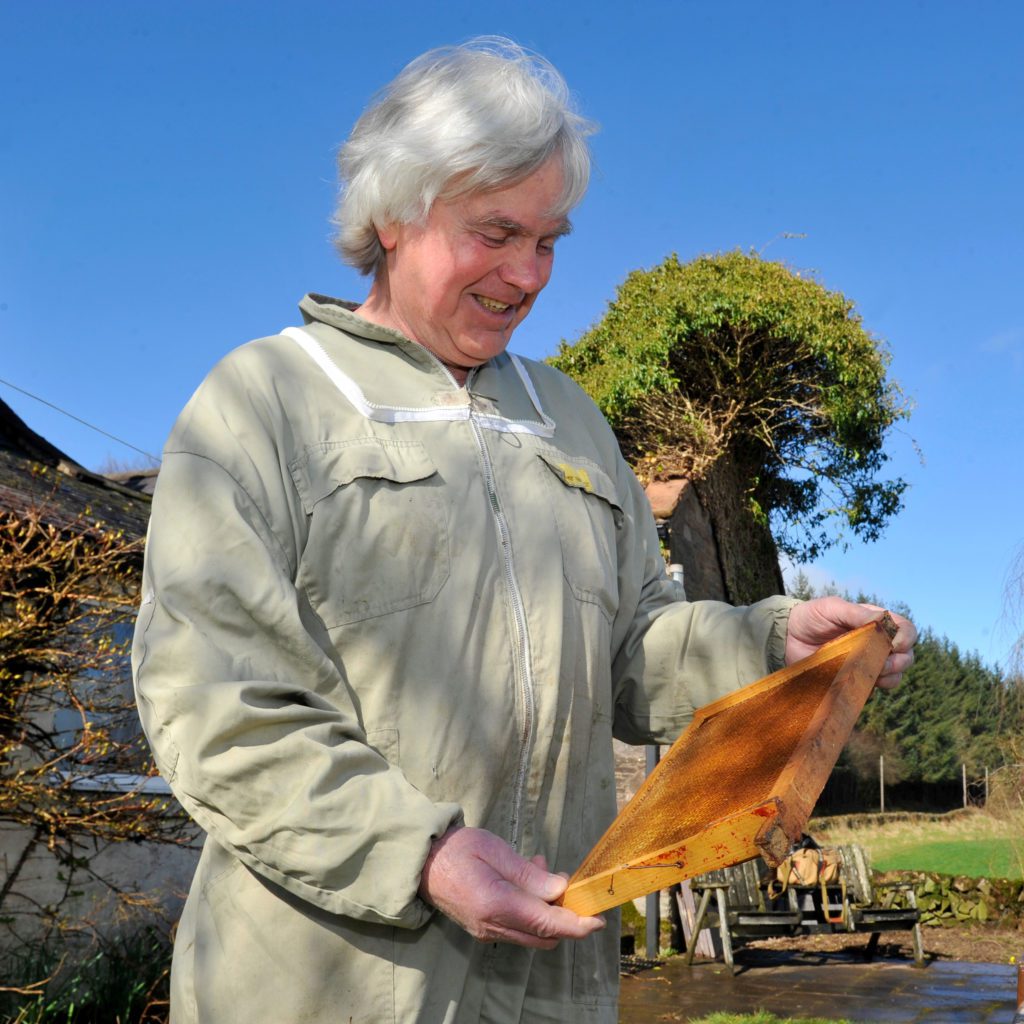
Producing high quality Scottish honey, means there is always a demand so he carries a years supply of stock in case it rains all summer and there is no honey.
He said, "I'm trying to cut back on hive numbers to around 200 which is a more realistic job for me to manage.
"At this time of year the bees need a huge amount of attention."
You have to inspect them frequently to see if they are producing queen cells which would lead to a swarm.
He said, "the first time you open the hives in spring after four months of winter, you take the lid off and there is a smell of warm yeast, and the bees and the brood and everything, it is just wonderful."
He said, "we have just taken 53 colonies over to the East Coast but although it is a 180 mile round trip it is worth for me as it means we will get another 50 lbs of honey from each colony."
He also has hives closer to home near Dumfries, both sets will be taken to the hills in mid July to produce the iconic Heather Honey.
The weather is always a concern, he explains, "until two weeks ago we were still feeding bees because there was no honey in the hives, and nothing was flowering.
"Bees need pollen for protein to feed the larvae and nectar or sugar syrup to live on.
"If they are not able to gather pollen, they are not able to rear young and it takes them a while to recover to full strength and by then the season is over."
A hard winter 10 years ago saw a lot of beekeepers lose their bees, but the Scottish Government stepped in with support.
He said, "for the next month I will be working everyday full time with the bees and then bottling in the evening, but sitting at home with a Drambuie at the end of the day is one of the benefits"
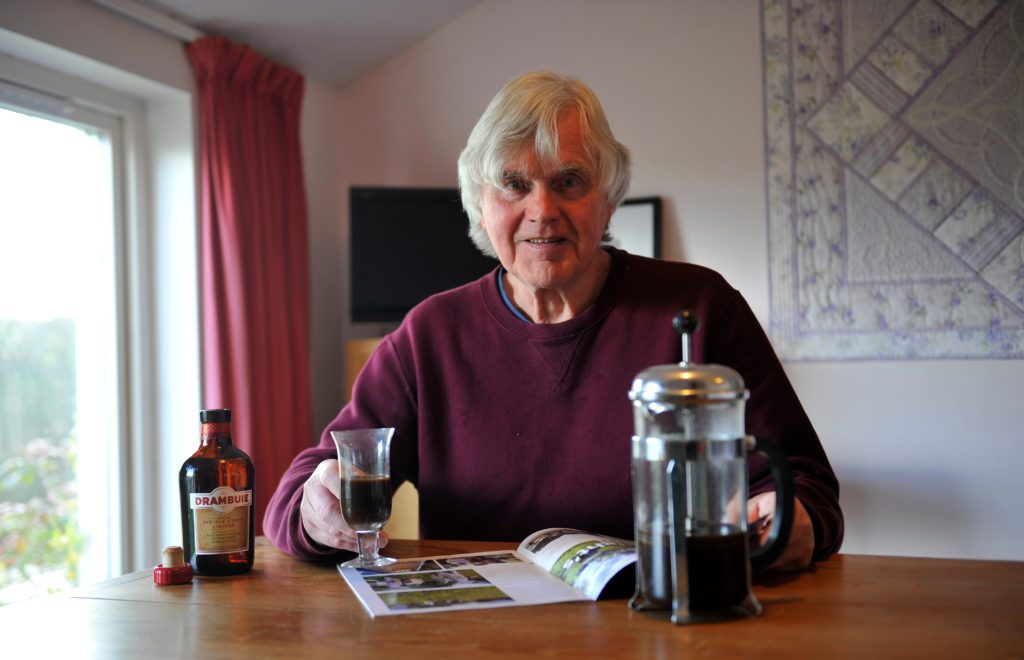
John said, "Joan does all the extracting and labelling but she doesn't enjoy the bees, however her major contribution is keeping me sane."
One issue for all bee owners are Varroa mite, which is a parasitic mite that attacks honey bees.
John said, "it is a massive problem if you do nothing about it."
Luckily, there are effective treatments, an impregnated strip made for hives like flea collars.
John said, "it is expensive, costing £5 per colony but that is money well spent because a dead colony has no honey."
He turned 75 this year but feels he ought to cut back his workload, "as the body is not quite as strong as it was."
He jokes, "Beefarmers don't tend to retire, my preferred way of going would be carrying a heavy hive back to the truck at the end of the heather season."
However helping the next generation of beekeepers is very important to him, so luckily he has no plans to buzz off anytime soon.
